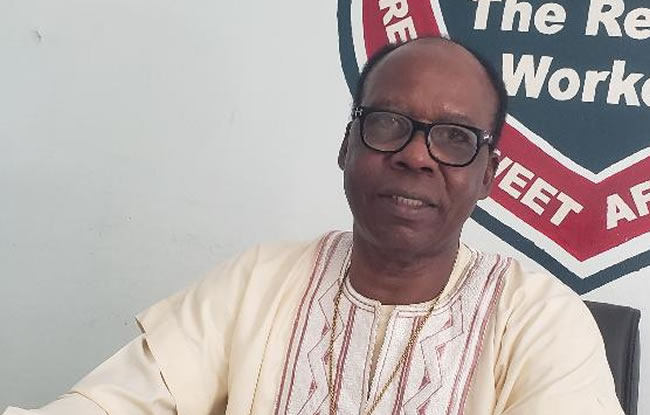Comrade Frederick Egwuaba, Chairman of the Federal Civil Service branch of the Nigeria Union of Pensioners (NUP), speaks with CHRISTIAN APPOLOS in this interview about issues affecting pensioners in the country.
What are the emerging issues in your union as the umbrella body of Federal Civil Service pensioners?
Aside from the usual internal disagreements, which are normal in any human endeavor, we are doing very well. There was a misunderstanding some time ago when some members wanted to hold onto leadership positions indefinitely. When we resisted, they took the matter to court. The National Industrial Court ruled against them. Following this, a new election was held, and I emerged as the new chairman. My team and I have since been working hard to reconcile our members so that we can move forward in the interest of their welfare.
Have you been able to reconcile dissenting voices in your union?
We are making significant efforts to bring all our members together and achieve unity among pensioners in the Federal Civil Service. Although we are still dealing with some issues from the out gone executive, my leadership is committed to repositioning the union.
What do you think causes leadership tussles in trade unions, whether for pensioners or workers?
Greed. Greed is the biggest enemy of trade unions. When someone is elected into office and begins to see that office as his personal investment, problems arise. This attitude hampers the progress of unions. Unfortunately, the same behavior we criticise in politicians is now being replicated in trade unions.
What is the best way to address this trend?
Sensitisation. Under my leadership, we have identified this issue as a significant problem. That’s why we are actively sensitizing members, reminding them that leadership positions are meant to serve the union, not for personal gain. When tenure expires, in line with our constitution, the leader must step aside for others to take over.
We are also educating our members that leaving a lasting legacy in office is far more valuable than holding onto the position. By respecting the constitution and stepping down when due, leaders write their names in gold. This message is central to our efforts to reposition the union.
The Pension Transitional Arrangement Directorate (PTAD) recently got a new Executive Secretary. What is your assessment of her performance so far?
So far, I can confidently say that the new Executive Secretary is working hard to address pensioners’ issues. Within a few months, she has resolved some of our challenges. We appreciate her efforts and wish her well.
We hope she continues the excellent work of her predecessor. A solid foundation has been laid, and we trust she will build on it.
PTAD’s “I Am Alive” platform for pensioners’ verification is gaining attention. How are your members coping with it?
The “I Am Alive” platform is an excellent innovation. In the past, pensioners had to travel to verification centers, often under difficult circumstances. Sadly, some lost their lives in the process due to ill health or accidents.
Now, with this platform, pensioners can complete their verification from the comfort of their homes. This has eased the process and restored dignity to retirees. However, there is still room for improvement.
Some members who have successfully completed their verification are still not on the payroll. Despite receiving acknowledgment letters from PTAD, their pensions remain unpaid. While we commend PTAD for its efforts, we urge them to resolve these lingering issues and improve efficiency.
What role should pensioners play in supporting PTAD’s “I Am Alive” verification exercise?
Many pensioners don’t fully understand the importance of the “I Am Alive” platform. Some see it as unnecessary protocol rather than a critical process.
We are working hard to educate members across states and local governments about its significance. It’s surprising that some state and local chairpersons are unaware of the platform. We are making every effort to ensure everyone is informed and properly guided.
The key message is that the “I Am Alive” platform verifies that a pensioner is alive, enabling payments to continue. Pensioners simply need to follow the simple steps, such as moving their heads during the verification process, to confirm their aliveness.
How would you rate President Tinubu’s administration in terms of pensioners’ welfare?
We are pleased with President Tinubu’s interest in pensioners’ welfare. Despite the tough economic situation, he approved a 20 per cent pension increase without agitation from us. He also introduced a minimum pension of ₦32,000 for Defined Benefit Scheme pensioners.
However, implementation has been slow. Many pensioners are yet to receive these benefits. We call on the President to ensure that funds are released promptly to PTAD for disbursement. Prices of goods and services are soaring, and these payments are essential for our survival.
What steps should the President take to address inflation and its impact on pensioners?
The government must adopt urgent measures to stabilize the economy and control inflation. This includes implementing monetary and fiscal policies to stabilize the naira, reduce inflation, and manage the money supply effectively.
Subsidies for essential goods and services like food, healthcare, and transportation should be introduced or expanded. Pension benefits must also be reviewed regularly to align with inflation, ensuring retirees can meet their basic needs.
Encouraging local industries and agriculture will reduce dependency on imports, drive down costs, and create jobs. The government should also enhance social safety nets for retirees and other vulnerable groups.
Finally, engaging stakeholders, including pensioners’ unions, in policy formulation will ensure that their needs are addressed. These steps will restore hope and dignity to pensioners and contribute to overall economic stability.
READ ALSO: Group commends PTAD boss over budget defence









